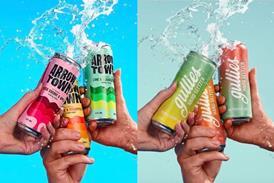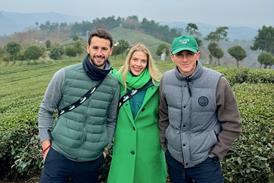The food industry is being slowly poked and prodded into becoming ever healthier, better labelled and more sustainable. And hard work though the process may be, most agree that the benefits outweigh the inconveniences. But there are potential casualties, reports Nick Hughes
"Don't it always seem to go that you don't know what you've got 'til it's gone."
It's unlikely Joni Mitchell had Horlicks Extra Light in mind when she wrote those words, but they could prove prescient as a triple whammy of EU regulation, government policies and sustainability concerns threaten foods the UK has come to take for granted.
Heinz knows all too well how consumers react to losing their favourite products. Its announcement in 2000 of plans to delist its struggling Salad Cream prompted an irate backlash from shoppers who suddenly realised they were rather partial to the venerable old sauce. Heinz had the opportunity to perform a u-turn. Other food manufacturers may not be so fortunate.
As well as the threat government health policy poses to everyday products such as ham and cheese, manufacturers are having to confront the possibility of losing SKUs of major branded goods to European regulation on nutrition claims.
So put aside thoughts of the giant panda for a moment to ponder the UK food industry's own endangered species.
Welfare
Products at risk: eggs from caged birds
The clock is ticking on the future of battery eggs, which will be outlawed by the EU in 2012. At that point, all UK egg producers will have to switch to higher-welfare enriched colony system caged birds, barn-reared or free-range production. Some retailers have already stopped stocking battery eggs. In January, Sainsbury's joined Marks & Spencer, Waitrose and The Co-operative Group in enforcing its own ban. Morrisons, meanwhile, is committed to phasing out own-label battery eggs by 2010.
Should UK egg producers fail to make the switch away from caged birds in time, supermarkets will be forced to sell imported eggs from Germany or Holland. Currently, 51% of eggs sold in the UK are from caged birds, according to the British Egg Information Service.
Nutrition claims
Products at risk: 'Extra Light' versions of Flora, Hellmann's, Philadelphia, Horlicks, Laughing Cow
Many household names face seeing their extra light variants pulled from shelves when new EU regulation comes into force on 19 January 2010. An annex of the Health & Nutrition Claims Regulation lists 24 claims that can legally be made for food and drink products. Extra Light, No Added Salt and X% less will no longer be valid spelling the end for the likes of Flora Extra Light, Hellmann's Extra Light, Philadelphia Extra Light and Horlicks Extra Light.
The CIAA is leading industry efforts to get an additional 41 claims added, but there is little chance of success, according to one industry source.
"We were told we'd have a chance to have a chat with the Commission about the Nutrition Claims annex, but for all sorts of reasons it's not likely to happen." Another source adds: "The indication from the Commission isn't that positive that we're going to get any changes."
Unilever, which owns the Hellmann's and Flora brands, says it is aware of the implications of the legislation and is taking steps to remove claims that are not likely to be included in the nutrition claims annex from its food brands.
Philadelphia owner Kraft adds: "It's a situation where we would make sure we have contingency plans in place."
The regulation will also affect food products marketed as 'no added salt'. This casts doubt over the viability of products such as Green Giant's No Added Salt or Sugar sweetcorn, which sits alongside its standard variant. A spokesman for brand owner General Mills, however, says there are no plans to change the wording on-pack, explaining that 'no added salt' is a factual statement relating to ingredient information and is not a nutrition claim. But there are plenty of others for whom the regulation will have a big impact.
The Food & Drink Federation says a straw poll of 10 of its members found that as a direct result of the Nutrition Claims regulation, 46 products would need to be relabelled; nine would need to be removed from the market; and a further nine innovations currently in development would no longer be launched. For one company alone, 12 product lines would need to be relabelled and would no longer be allowed to be marketed on the basis of their nutritional benefits. A further four of its products were likely to be withdrawn from the market because they would no longer be viable, it told the FDF. Another unnamed company had invested £400,000 in developing a product it hoped would generate sales of up to £5m, but that was now no longer viable to launch because of the marketing restrictions, according to the FDF.
Products at risk: tinned meats, extra mature cheese
Salt reduction targets foisted upon manufacturers by the Food Standards Agency threaten the future of products that rely on salt for their stability.
The Provision Trade Federation has already warned that targets for vacuum packed hams present serious food safety concerns, not least the risk of botulism. Hams were dealt a further blow this week when the World Cancer Research Fund urged parents not to give their children processed ham in their packed lunch, claiming there was "convincing evidence" that eating processed meat increased the risk of bowel cancer.
Salt targets for cheese, meanwhile, have put huge pressure on manufacturers of extra mature and vintage brands. "The more mature cheeses require a higher salt content to allow them to be robust enough to mature for sufficiently long to develop their flavour, so it is the cheeses at the top end of the maturation process that will struggle," explains Terry Hudson, cheese development manager at Milk Link.
The good news for these products is that the targets are voluntary and, as Clare Cheney, director general of the Provision Trade Federation, points out, it will be consumers, eventually, who decide what level of salt reduction is acceptable. "Nobody's going to try to sell a product that consumers don't like and won't buy. If it's not feasible to reduce salt levels in say, cheese, for technical reasons, then it won't be done and cheese sales will continue to thrive because people love cheese."
Products at risk: whole milk
As unlikely as it sounds, whole milk could find itself off supermarket shelves and consigned to the history books if industry trends continue.
Where once the full-fat white stuff accounted for the largest share of the milk market, it has found itself increasingly marginalised as consumer demand and government health warnings have pushed manufacturers towards developing skimmed or 1% fat milk.
Robert Wiseman Dairies' The One brand carries an on-pack endorsement by the FSA, while Arla and Sainsbury's also market 1% fat milks.
UK consumption of whole milk fell 40% between 1997 and 2007, according to data from DairyCo. In contrast, fully skimmed milk rose 9% in the context of a 15% fall in overall milk consumption.
"Over time it's evolved," says Richard Hollingdale, Milk Link's sales and marketing director. "Semi-skimmed milk is now the biggest seller of the three types of milk and the milk producers have started producing 1% milk that sits between semi-skimmed and skimmed, so they're moving the consumer on one step at a time."
Whole milk's position has been weakened further by the Food Standards Agency's saturated fat campaign, which encourages consumers to forego high fat products for lower fat substitutes.
Some observers suspect that, in time, whole milk could disappear from the fixture entirely. "I guess one day it might," says Paul Fraser, marketing director at Dairy Crest. "But I don't think it'll be next year, the year after or even in five years time. I don't think it's imminent."
Products at risk: cod, tuna, swordfish, sole
One of the starkest warnings to emerge from the government's recently published food security analysis involved global fish stocks. The paper warned that "the lack of incentives to preserve fish stocks threatens the sustainable use of an open-access renewable resource". In other words, we're running out of fish.
In the UK, a nation of conservative fish consumers, cod has long been under the spotlight from a sustainability point of view as global stocks deplete. Manufacturers and retailers have been actively promoting alternatives to cod such as whiting, coley and pollack, which Sainsbury's recently rebranded 'colin' in an attempt to make it more accessible to consumers.
There have, however, been recent signs that cod stocks are recovering. The chief executive of the Grimsby Fish Merchants' Association, Steve Norton, told The Grocer in March the UK was experiencing a resurgence in cod supply, adding consumers should eat cod "with a clear conscience".
Seafood manufacturer Young's, meanwhile, has begun sourcing North Sea cod again after a self-imposed two-year ban, citing an improvement in stocks.
Also under scrutiny is tuna, several species of which could soon become overfished, according to the International Seafood Sustainability Foundation. The ISSF was set up this year to ensure the long-term sustainability of tuna and promote use of sustainable stocks. UK retailers have already stopped selling bluefin tuna, but many have stood their ground over calls to stop selling other species of net-caught tuna, despite claims that stocks are in a perilous state.
Other common species on the Marine Conservation Society's 'fish to avoid' list are swordfish, marlin, sole and snapper.
Sign in to comment on this article
Not logged in before? Register for FREE guest access today.
You will be able to:
- Read more stories
- Receive daily newsletters
- Comment on stories
Advert













2 Readers' comments